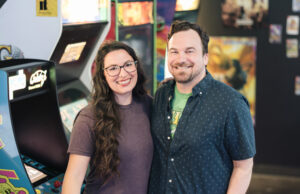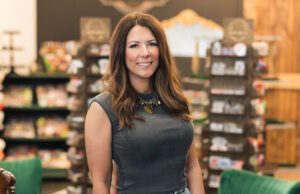
7,602 miles away from Saline County, a microscopic virus so small that 8,000 of them can fit on the head of a pin spread from the first infected person to our community and every corner of the world in a matter of weeks. The impact on every aspect of our day-to-day existence is difficult to adequately explain, describe or quantify. Words fail.
There is no frame of reference on what to expect or do. There are no roadmaps, procedures or protocols to address the uncertainty when information we are learning about the novel coronavirus seems to change daily.
So what does this county do when faced with tough times? That’s easy. We pull together, put on our thinking caps and do the hard work. We find ways to make it better. We move forward.
This time, while different from any other we have faced in our nation’s history, people throughout our county adapted. Most of all, out leaders stepped up.
The decisions weren’t easy. Some weren’t popular. But with a wider perspective and the goal of mitigating the spread, at the time of this writing, Saline County has 68 positive cases and 1 death compared to 1,182,615 positive cases and 68,247 deaths across the United States.
January 21, 2020 was the date of the first reported case of the novel coronavirus in the United States. Less than two months later on March 11, the first case was confirmed in Arkansas. As the numbers began to spike over the coming weeks, several states imposed orders for residents to stay at home. In Arkansas, Governor Asa Hutchison did not choose this course of action while the states on our borders did. Instead, targeted closings and restrictions were put into place in attempts to limit face-to-face interactions. Social distancing became the norm with the expectation that individuals stay six feet apart from each other.
Shortly afterward, schools were closed. Some businesses closed while others adapted to what everyone was calling “the new normal.” For public policy makers, it was time to make decisions based on local needs.
Saline County Judge Jeff Arey started discussions beginning in February.
“I started having conversations with Saline County Office of Emergency Director Brandon Guillot and Deputy Director Austin Walls.” said Judge Arey. “Those conversations were more ‘what if’ scenarios that at that time seemed a little farfetched. They led us to start having meetings with the different county offices to make sure we had plans and protocols in place to be able to continue to offer public services while keeping the public and county employees safe. It was early on, so it was hard to imagine that Arkansas would really be impacted, but everyone agreed we needed to be prepared.”
With schools no longer in session, the concern became the possibility of the youth of our county gathering at each other’s homes or public parks, therefore increasing the probability of spreading the virus. After weeks of discussions, an order was issued by Judge Arey to prohibit youth in county areas from leaving their home without adult supervision.
According to Judge Arey, “One of the most difficult tasks that public officials have is striking the proper balance in public safety and individual freedoms. I had been discussing this issue with other local officials, particularly Mayor Farmer and Circuit Judge Robert Herzfeld, who presides over Juvenile Court, for some time. We did not take this action lightly. It is widely known that the most likely vector for spreading the virus and causing death is between asymptomatic teens then transferring the virus to other teens and from there to parents and grandparents who are most likely to die. It’s for that reason that the Governor closed schools to on-campus instruction across the state early on. I would have strongly preferred that folks take this action on their own, but unfortunately that was not happening.”
For Circuit Judge Robert Herzfeld, the closure of schools hit a bit closer to home. “Governor Hutchinson closed Saline County schools, and my son, Leo, came home from the University of Arkansas where they had canceled in-person classes for the semester. We all went from ‘Hey, this might be a kind of a big deal,’ to ‘We’ve got to change how we do almost everything in our lives for the next several months,’ in what seemed like a heartbeat.” Judge Herzfeld had been keeping up on the research and science related to the virus and had been posting his concerns on social media as early as the second week of March.
With an understanding of how quickly the virus could spread, Judge Herzfeld, Judge Arey and Benton Mayor Tom Farmer put together a plan. As Judge Herzfeld recalls, “We began contemplating what it would mean to have tens of thousands of kids in our communities on the streets in the middle of a serious health crisis. Just having kids not in school was a concern for me as the Juvenile Judge, but stack on top of that the fact that the science tells us that a really high percentage of younger people can be asymptomatic and spread COVID-19 to their grandparents and neighbors or someone they bump into walking down the street. So, Judge Arey and I (and many others) were in discussions about finding the right solution to this question very early on. I remember him telling me over the phone on March 19 that he could see a large group of teens hanging out on the courthouse lawn through his office window—unsurprisingly, they weren’t socially distancing or following other COVID-19 protocols.”
For Mayor Farmer, issuing the stay-at-home order for juveniles within the city limits was in the best interest of all residents. “Up to April 6 we had increased in our positive cases. On April 6 we put into effect the juvenile order to protect the citizens. From April 6 till April 15 we had no increase in positives in Saline County. From April 16 to the present we have increased only 18 cases. The reason we felt so strongly about this order was that we had gotten reports of school-aged children roaming neighborhoods and the streets of Benton, as well as school-aged children knocking on people’s door and running away. Was it popular? No, but I have spoken to other mayors that were going to put something similar into effect.”
The city of Bryant did not issue an order for juveniles and when questioned, Mayor Allen Scott explains why.
“Bryant was asked to be a part of the stay-at-home directive for juveniles.” recounts Mayor Scott. “My challenge was that since closing our playgrounds, basketball and tennis courts and ballfields, we did not seem to be experiencing the same problem that Benton or Unincorporated Saline County was experiencing. After conversations with my police department, city staff who are out monitoring the community, and my daily drives around Bryant, I think that the approach that I took was appropriate for Bryant. In one or two instances, the police had to tell a small group (less than 10) to go home, but that was because they were violating other ordinances as well.”
For businesses, social distancing has put a particular bind on how to interact with customers. Benton Chamber of Commerce Executive Director Gary James says that while the pandemic has caused a shock in the business community, he is proud of the resilience he is seeing.
“I don’t think anyone could’ve known the impact the pandemic would have.” says James. “Overall, the attitude of business owners and leaders has been very positive and they want to work together to protect this community. Two segments of our community that have really stepped up are our restaurants and grocery stores. Restaurants have been creative and innovative in changing their business models to still provide top notch customer service to their customers. Grocery stores have met the challenges that were unexpectedly thrown at them and have still found ways to keep the supply chain moving to provide for our community. Non-profits, churches and our school districts have done an incredible job of still meeting daily needs in innovative ways.”
Through it all, it is clear from these leaders that the spirit of cooperation and community service is foremost among the people of this county. Each one of them credits their staff for adjusting to uncertain times and their willingness to do whatever it takes to get the job done. They are a reflection of the backbone of the people of this county. We pitch in when a neighbor is in need. We look after each other. Words may fail, but our actions never will.
We will come out of this on the other side a stronger community for the struggle.
And that, my friends, is the silver lining to this COVID-19 cloud.









0 comments